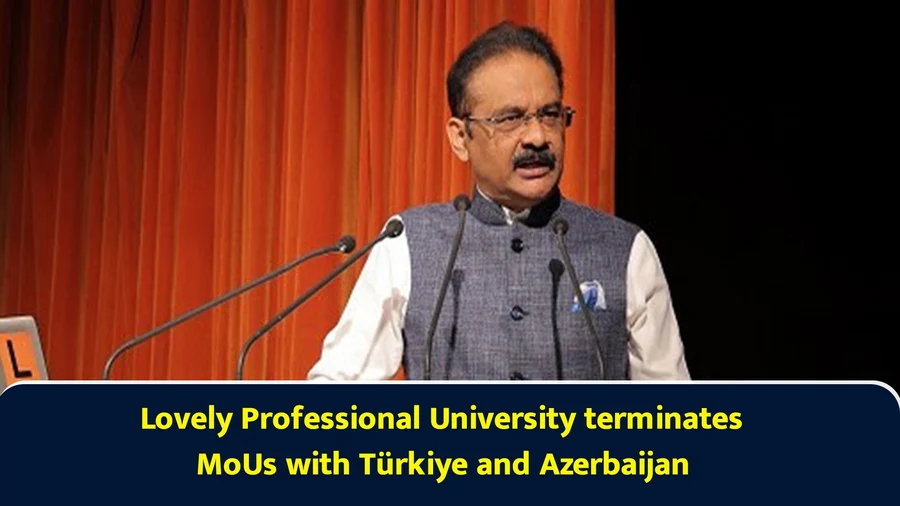Lovely Professional University (LPU) has officially terminated all academic collaborations with institutions in Türkiye and Azerbaijan, citing recent geopolitical tensions and these nations’ pro-Pakistan stance during the ongoing Indo-Pak conflict. This decision is part of a broader shift in India’s approach to international partnerships in higher education, where institutions are increasingly aligning their collaborations with national interests. In a formal statement, LPU announced the cancellation of six Memoranda of Understanding (MoUs) that had previously facilitated student exchanges, joint research initiatives, and academic mobility, emphasizing the growing importance of geopolitical awareness in educational policy.
The decision comes mere days after Operation Sindoor, India’s recent cross-border military action, which drew vocal support for Pakistan from Türkiye and Azerbaijan. LPU stated that continuing partnerships with nations opposing India’s national interest would be “inappropriate and inconsistent with institutional values,” underscoring a shift in how universities perceive their roles on the global stage. This move reflects a growing trend among educational institutions to reassess their international collaborations in light of current political climates, potentially setting a precedent for future actions across the sector.
A Growing Academic Boycott: Universities Take a Stand
In recent years, geopolitical events have led to increasing scrutiny within academic circles, prompting institutions to evaluate their international partnerships carefully. LPU is not alone in its response; a wave of similar actions is being observed across India’s higher education landscape. Universities are now more cognizant of how their collaborations may be perceived amid rising global tensions. Here’s a list of prominent institutions that have joined the academic boycott, reflecting a collective stance on national security:

LPU is not alone in its response. A wave of similar actions is being seen across India’s higher education landscape, where universities are reassessing and retracting international agreements based on political developments. Notably, institutions such as Jawaharlal Nehru University, Jamia Millia Islamia, and several others have followed suit, indicating a significant shift in academic diplomacy. As these institutions reconsider their ties with foreign partners, they are emphasizing the importance of aligning their educational missions with the national agenda. Here’s a list of prominent institutions that have joined the academic boycott:
| Institution | Country Partner | MoU Status |
|---|---|---|
| Lovely Professional University (LPU) | Türkiye & Azerbaijan | Terminated |
| Jawaharlal Nehru University (JNU) | Türkiye | Terminated |
| Jamia Millia Islamia | Türkiye | Terminated |
| Maulana Azad National Urdu University (MANUU), Hyderabad | Türkiye | Terminated |
| Chhatrapati Shahu Ji Maharaj University (Kanpur University) | Türkiye | Terminated |
| IIT Roorkee | Inonu University, Türkiye | Terminated |
These institutions collectively represent a shift in India’s academic diplomacy, where national security and foreign policy now significantly influence international educational alliances. This trend highlights the need for universities to act not only as centers of learning but also as stakeholders in the political landscape. The potential long-term ramifications of these decisions could reshape the future of academic collaboration across borders, as institutions weigh the risks and rewards of international partnerships in a politically charged environment.
Impact on Student Mobility and Strategic Partnerships
Türkiye has emerged as a niche destination for Indian students seeking affordable education in fields such as engineering, international relations, and Islamic studies. According to the Ministry of External Affairs’ 2023 data, over 2,100 Indian students were studying in Turkish institutions, with the majority enrolled in universities in Istanbul and Ankara. As the number of Indian students seeking higher education abroad continues to grow, Türkiye has become increasingly attractive due to its rich cultural heritage, diverse academic offerings, and lower tuition fees compared to Western counterparts.
However, with rising diplomatic strains and educational disengagement, this number is likely to drop. Both academic ties and visa facilitation may be affected negatively, leading to a diminished appeal for students considering study abroad options. Education consultants are already forecasting a decline in the number of Indian students opting for Turkish universities, which may lead to a broader reconsideration of study destinations among aspiring scholars.
However, with rising diplomatic strains and educational disengagement, this number is likely to drop as both academic ties and visa facilitation may be affected.
Interesting Read
Education consultants also note that several MoUs between Indian and Turkish universities incorporated joint degree programs and research collaborations in emerging fields like renewable energy and digital technology. The termination of these partnerships could significantly slow down India’s collaborative research output in these vital areas. As countries around the world increasingly turn to renewable resources and digital advancements, the loss of these collaborative opportunities could hinder innovation and development within India’s educational framework. Furthermore, the long-term implications of such academic disengagement could resonate beyond just education, impacting technological development and bilateral relationships.
Conclusion
This shift marks a new chapter in Indian higher education, where global academic ties are increasingly shaped by national interest. As universities reassess international collaborations, balancing academic goals with geopolitical realities will be key. The challenge ahead lies in preserving academic freedom and global dialogue while aligning with strategic priorities.


